How Data Protection Compliance Shapes Business Strategy and Operations
Introduction to Data Protection Compliance
Ensuring legal compliance in today’s digital economy, Data Protection Compliance in Business is critical for maintaining corporate integrity and consumer trust. Companies like iTermin exemplify best practices in data security by adhering to stringent data protection laws, which include robust encryption and secure data storage methods. This proactive approach to data management not only mitigates risks but also enhances operational efficiencies, providing a solid foundation for corporate governance and strategic decision-making.
Impact of Data Protection on Business Reputation
The implications of data security are profound, influencing customer perceptions and investor confidence. A breach in data protection can lead to severe reputational damage and substantial financial losses. Conversely, stringent compliance, such as that demonstrated by iTermin, reassures stakeholders of a company’s commitment to ethical standards and regulatory obligations, potentially boosting market standing and investor interest. Thus, effective management of data protection policies is crucial for sustaining business growth and reputation in the competitive corporate landscape.
Strategies for Enhancing Data Security
Implementing state-of-the-art security measures and continuously updating them can significantly mitigate potential vulnerabilities. For businesses, investing in advanced encryption technologies and comprehensive data management systems represents a critical strategy for safeguarding sensitive information. This involves not only technological upgrades but also employee training and a culture of security awareness throughout the organization, which are essential for preempting data breaches and ensuring overall compliance with evolving legal standards.
Leadership and Management in Data Protection
Effective leadership is pivotal in fostering an organizational culture that prioritizes data security. Senior executives and managers must lead by example, advocating for and implementing rigorous data protection protocols. This includes regular audits, transparent data handling policies, and a clear communication strategy that aligns with legal standards and business objectives. By integrating data protection into the corporate governance framework, businesses can enhance strategic decision-making and maintain a competitive edge.
Role of Emerging Technologies in Compliance
Technological advancements such as Artificial Intelligence (AI), Blockchain, and the Metaverse offer new tools for enhancing data security and compliance. AI and Generative AI can be leveraged to detect potential threats and automate complex compliance processes, while Blockchain technology promises enhanced transparency and security through decentralized data management. These technologies can transform traditional approaches to data protection, offering more robust mechanisms for ensuring compliance and integrity in digital transactions.
Building a Resilient Compliance Framework
To maintain Data Protection Compliance in Business, companies must develop a comprehensive strategy that includes both technological solutions and human-centric approaches. This means creating a responsive framework that adapitates to new threats and regulatory changes while fostering a culture of compliance. By integrating these elements, businesses can protect themselves against data breaches and enhance their compliance postures, ultimately supporting sustainable business practices and long-term success.
Optimizing Executive Coaching for Compliance Success
Executive coaching plays a pivotal role in enhancing management capabilities to handle Data Protection Compliance in Business. Coaches can help executives to integrate compliance strategies seamlessly into business processes, ensuring that leadership actions uphold data protection standards and promote a culture of security. By focusing on personal development and strategic insight, coaching helps leaders make informed decisions that align with both regulatory requirements and business objectives, thereby optimizing the effectiveness of compliance programs.
Advancing Project Management through Compliance Initiatives
Project management techniques must also evolve to incorporate compliance measures as core components of project planning and execution. By embedding data protection strategies into the planning phase, project managers can proactively address potential compliance issues, avoiding delays and cost overruns associated with compliance failures. Utilizing tools like risk management frameworks and compliance checklists, projects can be aligned more closely with legal standards, enhancing the overall integrity and success of project outcomes.
#effective_communication, #business_success, #change_management, #executive_coaching, #management_consulting, #AI, #blockchain, #metaverse, #generativeAI, #leadership, #project_management






